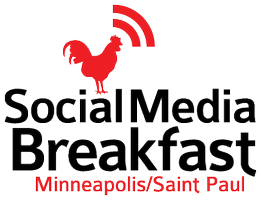 Minnesota is home to a tremendous amount of digital marketing and social media talent. The local Social Media Breakfast events are notorious for “selling out” in minutes and attracting upwards of 300 – 350 attendees. There are over 1,200 members of the group’s SMBMSP social network. The founder of this group is none other than Rick Mahn.
Minnesota is home to a tremendous amount of digital marketing and social media talent. The local Social Media Breakfast events are notorious for “selling out” in minutes and attracting upwards of 300 – 350 attendees. There are over 1,200 members of the group’s SMBMSP social network. The founder of this group is none other than Rick Mahn.
Officially, Rick is the founder of Social Media Breakfast – Minneapolis/St. Paul, Social Media Strategist for Land O’Lakes, blogger, podcaster and author for Personal Branding Magazine. As part of Online Marketing Blog’s continuing effort to showcase social media movers and shakers in the Midwest, I connected with Rick for the following interview.
You’re a technology guy that now works as a Social Media Strategist at Land O’ Lakes. Can you tell us about the journey to that position?
It’s been an interesting one for sure. I’ve always been fascinated by technology, whether it was computers, phones, snowmobiles (hey, we live in Minnesota right), or anything else that presented itself as a puzzle. It made for a great career in Information Technology.
Somewhere around 2002 I started taking notice of more web-oriented ideas and technology. It was the beginning of ‘web 2.0’ and the idea of creating your own space online was just as fascinating as the technology it ran on. I found myself reading and following some of the early adopters and thought leaders like Dave Winer (a fellow techy guy) and Doc Searls. This led me to eventually start blogging in 2004 and continuing into today.
Somewhere along the way the interest in using web 2.0 started to develop into an idea about the social web. From there the learning and networking led to opportunities to share and teach. I guess without knowing it I developed a second career option outside IT and started transitioning somewhere in 2007.
At Land O’Lakes today, it’s an interesting challenge. I do perform a few functions I used to do – mainly identifying what the business needs related to social computing and work to find ways to introduce those ideas into the organization. We have our challenges as any large company does, from productivity & security concerns related to social media, to addressing the perception and demonstrating value. It’s a tough job, but invigorating at the same time because I see folks at many levels starting to have those ‘aha’ moments. That makes it fun and rewarding.
 Not long ago, you started (along with some other forward thinkers) the now world-famous SMBMSP.org ala Social Media Breakfast – Minneapolis / St. Paul. From a few people meeting in a downtown Minneapolis Café to over 300+ attending sold out events, the momentum and value creation from SMBMSP is phenomenal. Can you share a bit about how that organization started and your thoughts on why it’s so successful?
Not long ago, you started (along with some other forward thinkers) the now world-famous SMBMSP.org ala Social Media Breakfast – Minneapolis / St. Paul. From a few people meeting in a downtown Minneapolis Café to over 300+ attending sold out events, the momentum and value creation from SMBMSP is phenomenal. Can you share a bit about how that organization started and your thoughts on why it’s so successful?
When I started SMBMSP in 2008, there was only one other Social Media Breakfast event – the original created by Bryan Person in Boston. I had connected with Bryan almost two years earlier when following blogroll links from some other folks in the Boston PR seen. He had some great content on his blog and I started reading and commenting along with a few others.
About September 2007, Bryan had this great idea of getting those talented Boston PR folks out for breakfast and talk social media over coffee and such. That first one that they held in November was a hit with about 20 or so folks showing up. People like Doug Haslam, Chris Brogan, and a several others were there taking pics, live tweeting and making it look like a darn good time. In December they did it again, and I email Bryan after New Years and said “if you have contacts with anyone in Minneapolis, you should have them set one up here”. Bryan simply responded “why don’t you”.
And that’s about it – I took that idea and ran with it. Our first SMBMSP was held at Key’s Café in Minneapolis with about 20 folks showing up. Little did I know that most of these folks would end up being peers and mentors, sharing ideas and tweets for the last two years.
What’s in store for SMBMSP in 2010 and how will you manage its explosive growth? What do you have planned for content and events in 2010?
It’s been challenging to keep up. Earlier this year I invited Mykl Roventine to join me in organizing and hosting the events. Mykl has become instrumental in helping take SMBMSP to the next level. We’re able to divide and conquer on organizing, drum up sponsors, keep up with our various community resources and develop ideas.
In 2010, we have a number of things on the drawing board. We’re working ahead to get events planned further in the future, and secure larger venues with specific amenities that we’ve missed in the past. We know that the key to success for SMBMSP is the people who attend. They trust that we’ll have valuable content and many of them participate in sharing ideas and connecting us with resources.
I know that SMBMSP is also viewed as an educational resource as well, with folks just out of school, and many people transitioning jobs or careers looking for information that will help them land a good job. We want to help in that and have some ideas in the works. We’re working on some great content for 2010 and a couple of fun events as well. Stay tuned.
For companies that are trying to wrap their arms around the world of social media in the enterprise, especially when it comes to building a business case, what advice do you have?
Educate. I’ve found that misunderstanding of what social media is and how it is of value for an organization is a real stumbling block. Especially at middle management, it seems to help when getting them up to speed on the concepts and methods that social computing employs.
Also, I try to bring case studies on related or relevant businesses when building that business case. It’s sometimes easier for those folks who are unfamiliar with social media to show them how it works for a competitor, similar product, or sized company.
Obviously, one of the big things is to convey the concepts in an understandable manner. While social media purists like to say “you don’t own your brand, your customers do”, that tactic is the fastest way to loose believability. Start explaining how the collective opinions of consumers shared among themselves sways public perception of the brand and they begin to understand what’s happening. Remove the hyperbole and get back to the basics of business.
A lot of enterprise social media efforts are focused on listening, community engagement, content and measurement. What other actions should companies be paying attention to?
Usability. Make it easier for those customers to share what they love about the product or brand. We’ve got so many nifty tools and networks to do this, but for the vast majority of people on the web they don’t have time or the inclination to experiment.
Mashups are the other thing to watch for. We’ve seen many in the past year, but I think rather than the next Facebook or Twitter, its creative combinations of these larger tools and networks. Look at the number of short video services leveraging Twitter. All the apps on Facebook that tie back to other networks, blogs, multimedia hosting services, and such. This is the semantic web that many folks were describing a year or two ago – this is where we’ll see a lot of new ideas come together in the next couple years.
Do you have a sense for how often companies create their own applications vs. using third party tools? Do you have a model for deciding, for example, when it’s better to create your own social network vs. leveraging something like Facebook or LinkedIn?
I don’t know that I have a model, but I have a few guidelines in mind as I work with companies regarding this question. First I try to figure out what their needs are – otherwise you end up trying to pound that square peg in the round hole.
Once I understand the needs, it makes that decision easier. Second, I determine if there is a “white label” service or tool that would work – i.e. can I customize Ning into something that will fit their needs. If the business need is unique, it then becomes important to understand what portions need to be custom built, and then find ways to bring in those third party networks and tools.
The faster I can find a path to use existing services and functionality, the sooner and cheaper I can get them engaging their customers. For example, why write a custom login & user database when we can simply have them log in with Facebook?
There are many companies that, when asked, will say they’re already “doing” social media. But there’s a difference between having accounts setup on Twitter and Facebook and actually using those tools to better connect with customers and grow a business. How do you explain the value of digging deeper into social participation to companies (or individuals) that equate personal use of social tools with effective use to meet business goals?
That’s a great question because its an easy mistake to make. Just because any of us use social media personally, doesn’t coincide with a business strategy for social media. This is especially interesting for those with a strong personal brand that work for, and represent a strong commercial brand.
Simply getting a c-suite individual on Twitter isn’t a strategy, but developing a framework and guidelines for adding Twitter as a customer support tool is. Making sure that the use of social media by individuals in their professional capacity is in alignment with the goals of the organization is key here. There needs to be a purpose, a reason, otherwise an organization won’t accomplish anything other than being “cool”, which doesn’t necessarily mean that they “get it”.
It goes hand in hand with the business case. Understanding the goals of the organization, finding the right combination of engagement methodologies within the social web, and defining a corporate strategy and usage guidelines to get that done is what the business needs. It’s not easy, nor is it as sexy as one thinks for a social media professional. When all is said and done, we’re here to support our customers in new ways and that is simply doing good business.
What social tools do you use most often?
I’m fairly predictable. I’m on Twitter most of all, along with Facebook of course. I am still a heavy user of RSS feeds in Google Reader and have found several add-ins for Firefox to help manage the load of content I read every week. Also, I’ve been fiddling with Foursquare of late, but outside of letting people know what I’m up to, I don’t find the game aspect interesting.
What are 3-4 resources (blogs, books, podcasts, web sites, newsletters, conferences, etc) for staying on top of social media?
There are many blogs, books and newsletters that I keep up on. Somewhere around 200 at last count in Google Reader. I know many of these folks personally, though I can only call a couple true friends rather than simply connections. There are too many to really give a good sampling but here goes:
- Chris Brogan & Jason Falls (Social Media Explorer)
- Mashable & Tech Crunch
- Small Business Survival & Successful Blog
Minnesota is a treasure trove of companies and talent in the digital, interactive and social media space, yet a bit of a “best kept secret” compared to the coasts. Please describe what impresses you most about the Twin Cities digital community.
Lee, you touched on a good one with this question. The folks we have here locally truly are a hidden secret. They’re talented, open minded, vocal, and very active in the community. I think having those Midwestern values that exist here in Minnesota also plays a role in that.
Going off the SMBSMP community that I’m most familiar with – the folks involved come from all professions and love to share. They look out for each other and trade information on opportunities as well as “how to” tips on social media. We are lucky to have a vibrant economy in the Twin Cities, which allows us to have some of the best minds in PR, Marketing, Web Development, Information Technologies, Business Management, and many more.
I have to say I’m honored to be able to help bring them together and learn from them. That’s probably the biggest thing I respect them for – they participate as a community in every sense.
What are your plans for 2010 and what will you be doing next?
Let’s see if I can come up with a good guarded reply. Exciting opportunities for many folks in social media exist, so I’m not alone. I plan on expanding the offerings of Social Media Breakfast here locally, and working with the group nationally to make some interesting things happen. I’m looking forward to next year to try out some new ideas and hopefully get a few new projects moving that I’ve been thinking on for the last few months.
Thanks Rick. Find more about Rick Mahn on the social web here:
- Twitter: http://twitter.com/rickmahn
- LinkedIn: https://www.linkedin.com/in/rickmahn
- Blog: http://rickmahn.com


